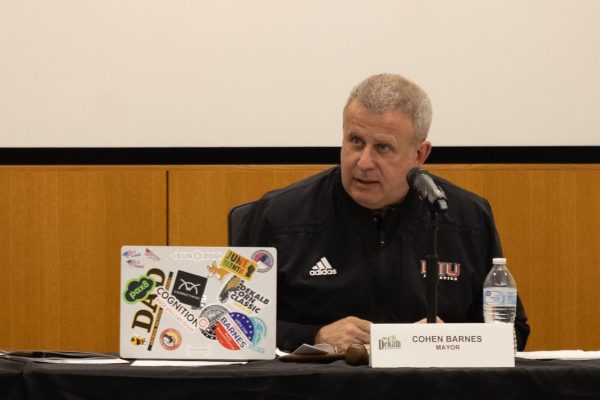Doctor discusses CTS prevention
September 29, 1993
It has been called tennis elbow, pitcher’s elbow, tendinitis, Nintendo thumb, and even arthritis.
It interfered with the work of over 400,000 people in 1990 and 1991.
If left untreated, it could require surgery costing your employer as much as $20,000, about the average yearly salary of an individual American worker.
The condition is Carpal Tunnel Syndrome (CTS), and is caused by prolonged repetitive motions of the hand. At 2:30 p.m. on Oct. 12, Jay Goldberg, M.D., will be presenting “Self Help for Carpal Tunnel,” a two-hour seminar on prevention and early treatment of the condition.
According to Terry Kessler, NIU benefits counselor and worker’s compensation coordinator for Insurance and Employee benefits, CTS is a condition which develops when a person has made the same hand motions over and over for a long period of time. For example, someone who types continually for eight hours a day, spends hours doing needlepoint, or repeatedly performs the same task on an assembly line, would be at risk.
The repeated trauma, as it is called, inflames a nerve inside the wrist, causing aches, poor blood circulation and nerve damage. If untreated, the symptoms become severe, disabling the hand and making surgery necessary.
Kessler said while most cases of CTS are occupationally related, some occur because of hobbies and recreational activities, such as needlepoint and bowling. She also stressed the danger of CTS exists for nonclerical occupations, although some people believe CTS to be a secretaries’ condition. Many types of jobs involve repetitious hand motions, she said.
Goldberg is a board-certified general surgeon and board-eligible plastic surgeon. He practices medicine at the Center for Hand and Microvascular Surgery of St. Louis. Among his areas of expertise are transplantation, re-attachment, and microsurgery.
According to Kessler, it is not common to have an expert surgeon address occupational disorders such as carpal tunnel. She said she hopes for large attendance because of the need for public awareness of this condition. Later this year, her office will sponsor presentations on CTS by an occupational therapist and a vocational specialist.
Also significant about this seminar is its sponsorship by Intracorp, a state medical evaluation network. Intracorp advises state employees who request medical services or surgery about the most advisable and cost-effective forms of treatment. For example, Intracorp might advise a CTS patient whether his or her condition requires surgery or only a splint or anti-inflammatory injection.
Goldberg will emphasize prevention and early treatment as the best ways to avoid surgery, Kessler said. He also will mention the types of work that tend to lead to CTS and ways to modify work to prevent CTS from setting in. Kessler hopes the presentation will result in more people making both the occupational and lifestyle changes needed to protect their hands and wrists from CTS.













